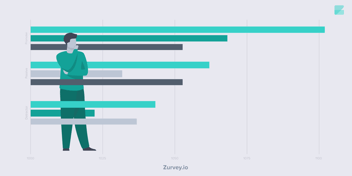The Future of Data Democratization
Many businesses have been on the path to democratizing their data for a few years, taking data-driven decision making to all levels of their organization. This process is evolving as capabilities change and experience in the field gathers. What have been the main learnings so far, and what trends are to come in the future of data democratization?
Digital transformation strategies have gained a lot of momentum in the past decade. Global spending on digital transformation reached over $1.3 trillion in 2020, with a 10.4% growth compared to 2019. Expenditure on digital transformation is projected to be $3.4 trillion by 2026.
The enhanced use of data has become an essential ingredient of a business’ digital transformation. Making business decisions has become data-driven via metrics and insights as main guides, and these need smart tools to collect and analyze them. Those who have not yet saturated their business processes with data analytics are now lagging behind.
Yet without democratization, the benefit of digital transformation is still greatly reduced. That is because once the need for information arises, a traditional data management operation requires users to submit a request to IT. Even if they have permission to access the data, it might take a long time for IT to produce and deliver the information.
Adopting the data democratization management paradigm solves this bottleneck in the data use process. But don't skip putting a data governance framework in place first. This is a set of principles and processes that defines how an organization collects, stores, and uses data.
Shifting the company culture in favor of data democratization
The data governance framework puts the cultural shift needed for democratization into motion, and enables the creation of a self-service insight pool. By 2026, 20% of large enterprises will have adopted a single data and analytics governance platform, based on Gartner’s predictions. But, as the term ‘cultural shift’ already suggests, the adoption of data democratization has its challenges.
Besides the technical implementation of data access via self-service tools, gaining data literacy skills is a significant step. This includes data analysis and AI modeling basics. According to Experian’s 2023 research, incorporating data skills leads to better cross-functional collaboration, deeper customer insight and product innovation.
Yet, the whole company culture needs to become data-driven, which takes time to solidify. In this process, employees are empowered to make decisions based on the insights and reports they receive. The result is a team where members take ownership over company targets.
Artificial intelligence’s emerging role
As more businesses proceed with data democratization in the future, giving employees access to data and analytics tools won’t be enough. Incorporating AI capabilities can give you the competitive advantage you’re looking for. AI can be put to great use in several areas:
- Data visualization will mean much more than charts and graphs, leveling up to captivating data storytelling. Gartner predicts that by 2026, 50% of BI tools will activate their users’ metadata. They’ll offer insights and data stories with recommended contextualized journeys and actions.
Narrating data helps non-technical users directly comprehend insights. Data stories transform analyses into relatable reports. This facilitates decision-making across all levels of your company.
- This is beneficial also because making a vast amount of data available to everyone can lead to information overload. Effective data visualization prevents information fatigue. Users can filter out relevant insights from the noise.
- Augmented analytics tools like Zurvey.io, propelled by AI and machine learning, will automatically identify patterns, generate insights, and offer natural language processing (NLP) interfaces. This means that even users without a background in data analysis can easily tap into actionable insights. NLP enables interaction with data tools using natural language queries and commands. Non-technical users will simply type in questions to retrieve insights.
- Machine learning algorithms also automate data preparation tasks, such as cleaning, transforming, and merging datasets. This reduces the time and effort required from users. Algorithms can identify outliers or unusual patterns in datasets as well, alerting to potential issues or overlooked opportunities.
- Personal AI data stewards will deliver unique data experiences. They work based on roles, preferences, and interaction history. Users will be able to train them to represent their data interests. When companies request access to data, the AI steward will assess the terms, negotiate for fair conditions, and accept or decline the offer.
Enhanced Data Governance and Security
Data democratization is revolutionizing the way organizations perceive and handle data. Exceptional opportunities for innovation and collaboration are coming. But like most big changes, this shift also comes with significant challenges. Maintaining ethical standards and preventing the misuse of open data will take work. In this new era of accessible data, we must find balance between democratization benefits and ethical practices.
Robust data governance and security will be a priority in the future of data democratization. Organizations will take strict measures to monitor data usage, ensure compliance, and protect sensitive information. The goal is to maintain both the trust among users and the integrity of data-driven processes – so what will this look like?
- Decentralized identity solutions will be applied, paired with data vaults. These solutions grant users complete control over their personal information. Users determine who accesses their data and for what purpose.
Data vaults securely store sensitive information, so that only authorized parties gain access. Smart contracts and encryption mechanisms facilitate selective data sharing. This allows users to maintain their data privacy while still benefiting from data transactions.
- Hybrid and multi-cloud data strategies will balance accessibility and security even more. A mix of on-premises and cloud-based solutions will ensure data availability, while adhering to regulatory requirements. This approach provides flexibility, scalability, and resilience.
- Cloud computing will continue to play a significant role in data democratization also because it creates collaboration opportunities across the globe.
Prioritize data-centric thinking and human potential
Planning for possible future scenarios is a vital aspect of modern business leadership. As the landscape of data democratization evolves, businesses will have to recognize the role of artificial intelligence. The integration of AI technologies not only enhances data visualization and interpretation, but also streamlines data preparation and fosters personalized data experiences.
The importance of enhanced data governance and security cannot be overstated either. Organizations used to develop their cybersecurity programs to address regulatory changes. The cybersecurity leaders of tomorrow will use a human-centric design to strengthen their program. Striking a balance between accessibility and ethical practices will become a key challenge. Businesses will need to embrace decentralized identity solutions, hybrid data strategies and cloud computing.
Share:
.png?width=352&name=new_input_methods_Rajzta%CC%81bla%201%20(1).png)



